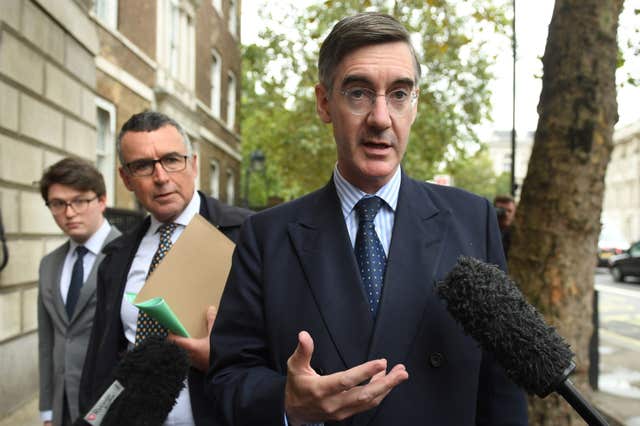
Conservative hard Brexiteers have released proposals which they believe could allow the UK to leave the EU’s single market and customs union without the need for a hard border in Ireland.
The European Research Group (ERG) of Tory backbenchers – led by Jacob Rees-Mogg – believe the Government has allowed the border question to become a roadblock to achieving a Canada-style Free Trade Agreement with the EU.
In a new paper, they propose the Government should agree equivalence of UK and EU regulations for the safety of agricultural products and allow EU inspectors into Northern Ireland to check on their implementation.
Northern Ireland and the Republic would be maintained as a Common Biosecurity Zone after Brexit, allowing the smooth movement of these goods across the border.
“Since UK and EU standards are identical and will remain identical at the point of departure, determining equivalence after Brexit should be straightforward,” said the document.
For other goods, the ERG said existing simplified customs procedures could continue to be used to avoid the need for checks at the border.
Larger companies would use “trusted trader” schemes to clear their goods for export and import, and other declarations would be incorporated into the existing system used for VAT returns.
The ERG paper said that Brussels had made “a major error” in listening almost solely to the warnings of Leo Varadkar’s government in Dublin on the potential for the border issue to disrupt the peace process, contrasting his administration’s stance with the “co-operative and practical” approach of predecessor Enda Kenny.
Warnings that manned checkpoints at the border would become a target for terrorists fail to recognise that checks are already conducted for tax, VAT, currency, excise duties and security without the need for any physical intervention at the border, said the group.
They cited customs chiefs from the UK and the Republic who have said they do not expect new infrastructure to be needed after Brexit.
They argued the Withdrawal Agreement proposals on the border are themselves a “clear breach” of the Good Friday Agreement, which requires decisions on the future of the border to remain a matter for the people of Northern Ireland.
“The key obstacle in the negotiations is the EU’s concern that goods could enter into the Single Market area through the Irish border without being compliant with EU standards or tariffs,” said the ERG paper, launched in Westminster.
“The question for the EU is whether this risk to the integrity of the Single Market is so serious that it could block a Free Trade Agreement with the UK.”
And it added: “In the debate over solutions to the Northern Ireland border issue, a proper sense of scale, perspective or proportionality has been lost.
“The EU’s objections are political not practical. The Government has failed to set out what can be done to provide for customs compliance without physical checks or infrastructure on the Northern Ireland border.”
The document said that, under the ERG’s proposals, “the EU will be able to maintain the integrity of its internal market without erecting a hard border along its border with Northern Ireland.
“At the same time, the United Kingdom will be able to develop a fully independent trade policy rather than remaining a rule-taker.”

And it added: “This allows the United Kingdom to conduct an independent trade policy without threatening the integrity of the EU single market.”
The ERG shrugged off the prospect of an open border in Ireland becoming a route for illegal immigration into the UK.
In practice, immigration is prevented not at the border, but by measures to make it difficult for illegals to obtain work, accommodation and welfare, said the paper.
In response to EU concerns that goods that do not meet its standards – like US genetically-modified crops and chlorine-washed chicken – might enter its markets via Northern Ireland, the ERG said that such breaches could be handled in the same way police on both sides of the border currently tackle smuggling of drugs, fuel or alcohol.
“Law-enforcement agencies on both sides of the border co-operate to suppress smuggling without anyone suggesting that border posts and checks would make their efforts more effective,” said the ERG.
“If they can tackle trade in drugs, fuel, tobacco and alcohol without infrastructure at the border, they can prevent non-compliant goods from the UK reaching Irish retail outlets in the same way.”
The ERG said its proposals could be delivered without weakening North-South co-operation.
“There is nothing which would reduce our commitment to the Belfast Agreement, or which might jeopardise peace in Northern Ireland,” the group said.
“Harnessing the latest developments in international best practice can deliver continued co-operation and prosperity in the best interests of the United Kingdom and the Republic of Ireland.”


Comments: Our rules
We want our comments to be a lively and valuable part of our community - a place where readers can debate and engage with the most important local issues. The ability to comment on our stories is a privilege, not a right, however, and that privilege may be withdrawn if it is abused or misused.
Please report any comments that break our rules.
Read the rules here